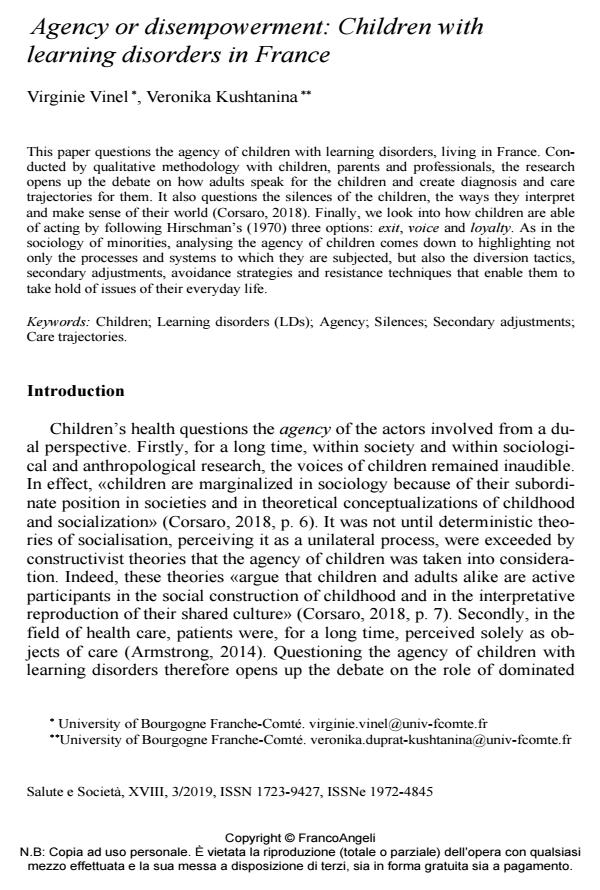Agency or disempowerment: Children with learning disorders in France
Titolo Rivista SALUTE E SOCIETÀ
Autori/Curatori Virginie Vinel, Veronika Kushtanina
Anno di pubblicazione 2019 Fascicolo 2019/3
Lingua Inglese Numero pagine 12 P. 107-118 Dimensione file 150 KB
DOI 10.3280/SES2019-003010
Il DOI è il codice a barre della proprietà intellettuale: per saperne di più
clicca qui
Qui sotto puoi vedere in anteprima la prima pagina di questo articolo.
Se questo articolo ti interessa, lo puoi acquistare (e scaricare in formato pdf) seguendo le facili indicazioni per acquistare il download credit. Acquista Download Credits per scaricare questo Articolo in formato PDF

FrancoAngeli è membro della Publishers International Linking Association, Inc (PILA)associazione indipendente e non profit per facilitare (attraverso i servizi tecnologici implementati da CrossRef.org) l’accesso degli studiosi ai contenuti digitali nelle pubblicazioni professionali e scientifiche
This paper questions the agency of children with learning disorders, living in France. Con-ducted by qualitative methodology with children, parents and professionals, the research opens up the debate on how adults speak for the children and create diagnosis and care trajectories for them. It also questions the silences of the children, the ways they interpret and make sense of their world (Corsaro, 2018). Finally, we look into how children are able of acting by fol-lowing Hirschman’s (1970) three options: exit, voice and loyalty. As in the sociology of mi-norities, analysing the agency of children comes down to highlighting not only the processes and systems to which they are subjected, but also the diversion tactics, secondary adjustments, avoidance strategies and resistance techniques that enable them to take hold of issues of their everyday life.
Parole chiave:Children; Learning disorders (LDs); Agency; Silences; Secondary adjustments; Care trajectories.
- Enfants acteurs, enfants agis Virginie Vinel, Francesca Zaltron, in Revue des sciences sociales /2020 pp.12
DOI: 10.4000/revss.4752
Virginie Vinel, Veronika Kushtanina, Agency or disempowerment: Children with learning disorders in France in "SALUTE E SOCIETÀ" 3/2019, pp 107-118, DOI: 10.3280/SES2019-003010